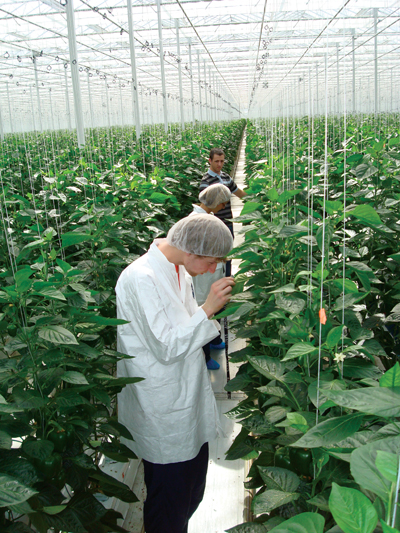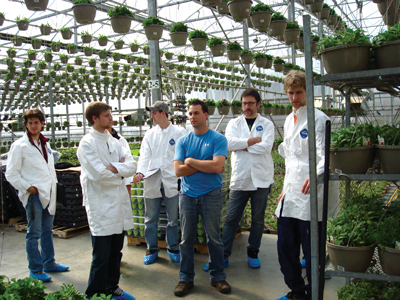
MGS Horticultural has a long history with the University of Guelph.
Many MGS staff members are graduates of the University of Guelph or
Ridgetown College.
MGS Horticultural has a long history with the University of Guelph. Many MGS staff members are graduates of the University of Guelph or Ridgetown College.
 |
|
| The tour also visits with flower growers. Advertisement
|
In 2006, we were approached by Dr. Cynthia Scott-Dupree, a professor at the University of Guelph School of Environmental Sciences (formally the Department of Environmental Biology). Dr. Scott-Dupree teaches the third-year Integrated Pest Management (IPM) course and was interested in providing her students with the opportunity to see IPM in action.
We developed a field trip program to introduce students to large-scale greenhouse production and help generate an interest in our industry. Since the spring of 2007, MGS has hosted an annual spring field trip to Leamington area greenhouses for Dr. Scott-Dupree’s class and Dr. Theo Blom’s third-year Greenhouse Production class. Approximately 70 students have participated in the tours over the years.
The students are divided into three groups, and each group visits a different combination of greenhouses; tomatoes, peppers, cucumbers and/or flowers/propagation. MGS biological and technological sales staff transport students and guide the tours.
More than a dozen farms have participated in this program. Greenhouse owners generously open their doors to us and provide knowledgeable staff (either the owner or one of the growers) to guide the tour through their operation. Students enjoy interacting with the greenhouse staff and appreciate getting the “practical” side to complement their in-class studies.
 |
|
| Students get a first-hand opportunity to scout for pests;
|
Each greenhouse is a unique entity; there is always something new to learn at each location. IPM and bumblebee pollination programs are highlighted at each farm. Students are able to observe biological control agents performing on a commercial scale and develop an appreciation for the complex ecosystem that exists in the greenhouse. For example, we are able to show spider mite hot spots that have been controlled with P. persimilis, and aphid colonies decimated by ladybugs, A. colemani and adult lacewings.
Throughout the tours, explanations on the general running of the operation are presented. Topics ranging from fertigation and varietal differences to heating methods and venting programs are discussed.
This tour has developed a solid reputation with the classes. The professors receive positive feedback from all the students. Most students have never been exposed to large-scale commercial greenhouses and are impressed by the scale and high level of technology used within.
Our annual tour is a great opportunity for students to experience the scope of the greenhouse vegetable and flower industries and stimulate an interest in the countless opportunities that exist within the industry. ■
Print this page